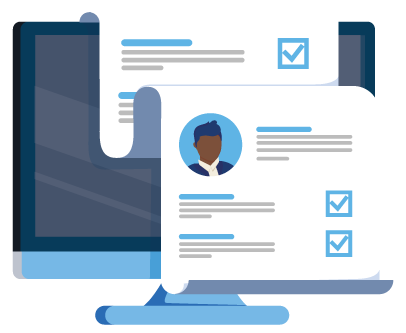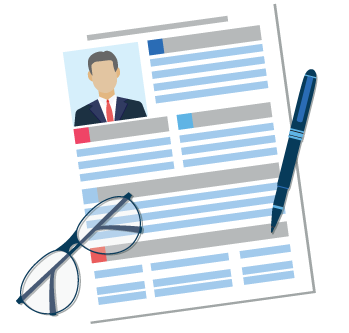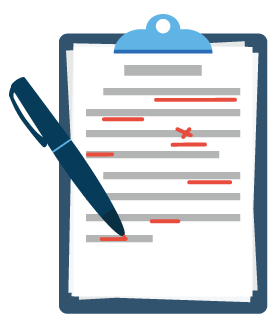As recruiters, we commonly get questions from candidates at all career levels around how they can improve their resumes. What should be included? How should employment gaps be handled? How can they best stand out from other well-qualified individuals?
Everyone has resume anxieties at some point. However, a well-constructed resume is often the first step to getting your foot in the door at your dream company. It can also serve as a valuable professional development tool, enabling you to review your career roadmap, connect the dots within your story, and identify any experience gaps that may need to be addressed. Here are a few ways to compile a resume you’ll feel confident sharing, no matter where you are in your career.

New Graduates and Entry-Level Professionals
When applying for entry-level positions, it’s understood you may not have a surplus of applicable work experience. Instead, try to leverage your skills and convey your passion for the industry. The less experience you have, the shorter your resume should be; in this case, that likely means one page.
Share your school and major, including your GPA if it is particularly impressive (such as graduating magna cum laude). Include specific courses only if they are outside of your degree and apply to the role. For instance, if you majored in finance, it’s understood you completed the necessary finance courses. However, if you took a relevant course outside of your major, such as a coding class, you may choose to include it. Extra curriculars can also be omitted unless they’re relevant to the role and/or demonstrate leadership qualities.
For those seeking their first professional roles, gaps in employment history are standard and expected. Holding a summer job that ended when the school year began or interning for semester-long periods are common. When reviewing your work history, think through how your experience, even if it’s limited, relates to the types of roles you’re aiming to secure. For instance, if you seek a customer-service oriented role, draw a connection to how working at a grocery store built and strengthened that skill.
 Experienced Professionals
Experienced Professionals
As a mid- or late-career professional, approach your resume from the lens of the role you want, rather than your current role or past positions. For instance, if you are an underwriter who wants to move into project management, you will want to highlight different accomplishments and responsibilities than if you’re aspiring to a more senior underwriting role.
When you’re established in your career, your resume can extend past one page, as long as the information you provide is still relevant and concise. Include key skills and areas of expertise, speaking to position highlights rather than a laundry list of responsibilities. If you performed the same task in multiple roles, don’t waste resume real estate repeating it under every position. Instead, include relevant projects, skills and business impact. It’s also not necessary to include what the actual companies you worked for do, unless you ran your own business. Be forthright with any employment gaps in your career history, rather than trying to avoid them. If your time off was related to professional development, such as training or pursuing an advanced degree, don’t hesitate to include that in your resume. Your goal is to introduce yourself to an employer and showcase well-edited, easy-to-read highlights.
 Those Reentering the Job Market
Those Reentering the Job Market
In today’s employment landscape, it’s not uncommon for individuals to step back from their careers for a few months or years. Personal reasons, advanced degrees, health issues and sabbaticals all commonly come into play. However, reentering the job market can be daunting. In this case, the reverse chronological resume format may not be the most effective. Consider segmenting your resume by experience, rather than dates.
Include a note in the summary section of your resume explaining that you are passionately seeking to reenter the workforce. Share how you have kept up with relevant skills during your time away from the industry. Be transparent with where you currently stand in your professional life and what you want your next steps to be.
General Resume Best Practices
While there are a few unique considerations for tackling your resume at different career stages, several universal best practices hold true:
Keep it up to date. Your resume isn’t just a necessity for job applications. It can also be used for networking, internal career discussions, thought leadership opportunities and your own personal career mapping. By maintaining an up-to-date resume, you won’t be scrambling when you eventually need it.
Tailor your resume to the role. As a general rule, you should have versions of your resume geared to each different type of position you are interested in. However, if your dream job becomes available, take some time tailoring it to that specific position description and aligning your experience and skills to those desired in the role.
Connect your skills to the job. If there’s a particular position you are interested in, a cover letter can help connect your skills to the specific role. However, this can also be done through a summary section at the top of your resume. Include a short paragraph or bullet points to provide a snapshot of your skills, your experience level and where you want to be in your career.
 Edit your skills list. Keep your list of skills as relevant and targeted as possible. Leave off programs like Word, but do share proficiencies such as advanced Excel. Avoid listing vague skills such as communication and organization, instead sharing that you’re a green belt in project management or a member of organizations like Toastmasters.
Edit your skills list. Keep your list of skills as relevant and targeted as possible. Leave off programs like Word, but do share proficiencies such as advanced Excel. Avoid listing vague skills such as communication and organization, instead sharing that you’re a green belt in project management or a member of organizations like Toastmasters.
Make it reader friendly. People should be able to look at your resume and understand where you’ve worked, how long you were there, your title and your contributions. Focus on following a uniform and consistent format for readability.
Include your education. Share your school and relevant certificates at all career stages. Recruiters may be looking for someone who holds a certification in a certain state and often use alma maters to source this information.
Proofread. You’ve put a lot of time and energy into your resume. Don’t distract recruiters and hiring managers with typos and misspellings. Ask your friends, mentors and other trusted individuals to review and provide feedback on your resume.
No matter where you are in your career or job search, there are benefits to a well-constructed, comprehensive resume. Take this a step further by refreshing your LinkedIn profile. And, if you’re updating your resume for a job search, here’s how to prepare for a stellar interview.